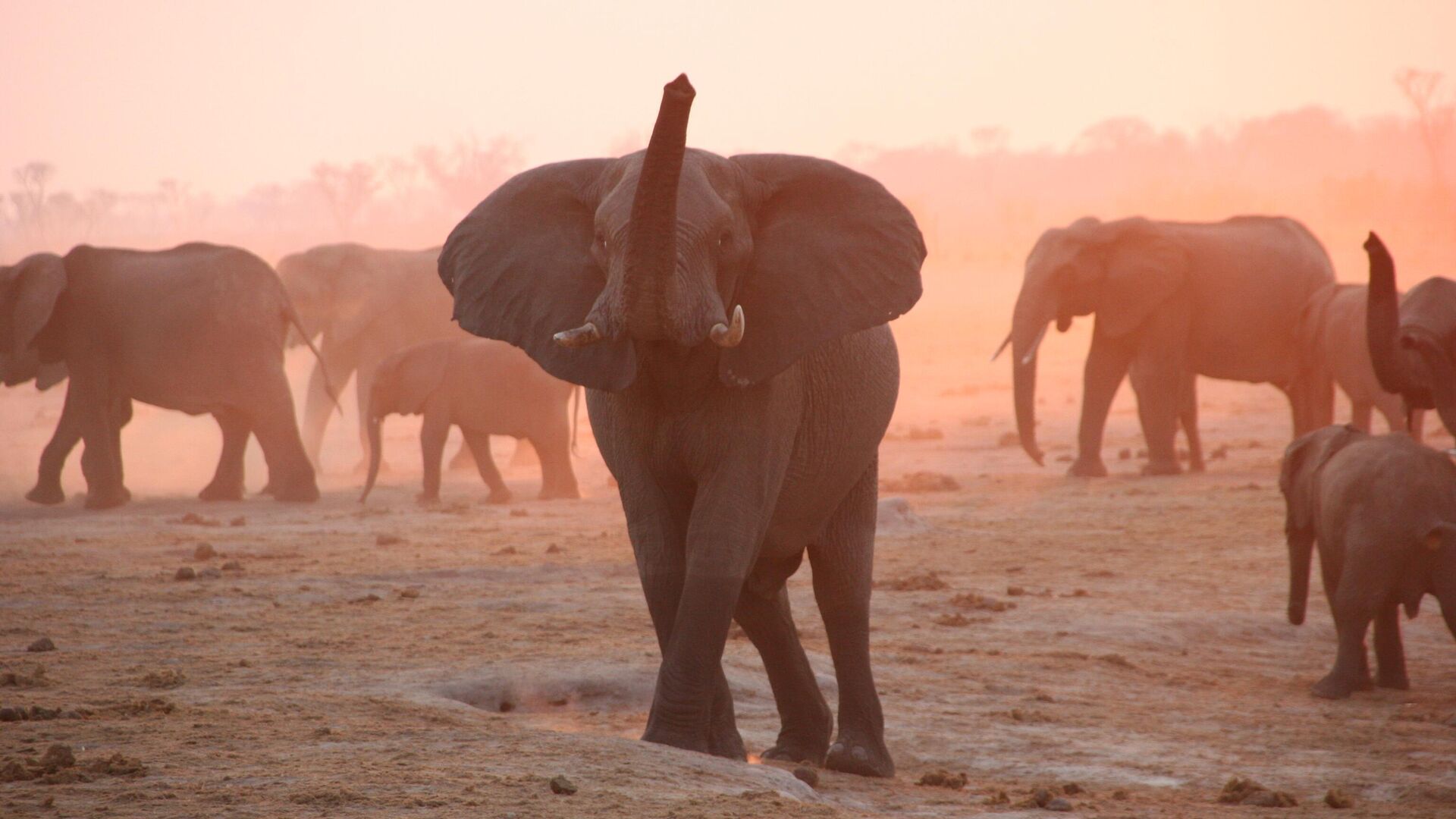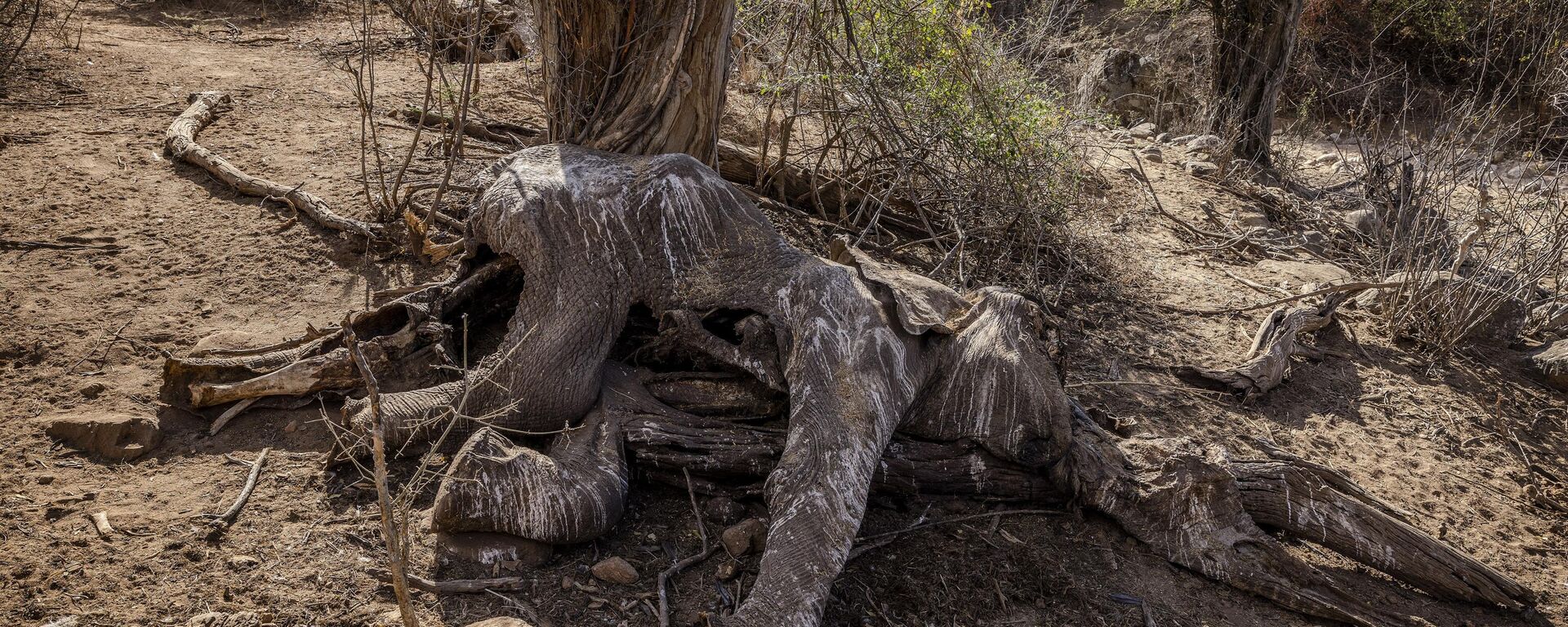https://en.sputniknews.africa/20231208/dozens-of-elephants-in-zimbabwe-reportedly-died-due-to-climate-change-1064023861.html
Dozens of Elephants in Zimbabwe Reportedly Died Due to Climate Change
Dozens of Elephants in Zimbabwe Reportedly Died Due to Climate Change
Sputnik Africa
In early November, the UN World Meteorological Organization said the El Niño weather phenomenon, a climate condition that describes an unusual warming of... 08.12.2023, Sputnik Africa
2023-12-08T16:53+0100
2023-12-08T16:53+0100
2023-12-08T17:54+0100
sub-saharan africa
zimbabwe
southern africa
botswana
animals
animals' protection
environment
climate change
climate
elephants
https://cdn1.img.sputniknews.africa/img/07e7/0c/08/1064024331_0:160:3072:1888_1920x0_80_0_0_2b854640eacc6293a7f888cae44a2987.jpg
Dozens of elephants have died of thirst in Zimbabwe's Hwange National Park as drought triggered by climate change and the global El Niño weather pattern dries up watering holes, Daphine Madhlamoto, Zimbabwe Parks and Wildlife Authorities (ZimParks) official, told Western media.Environmentalists fear the loss of more elephants in the park, the official explained, noting that there are no major rivers flowing in Hwange and the animals rely on solar-powered boreholes that cannot draw enough water. She added that the park has experienced the effects of climate change with less rainfall.Media said its reporters had spotted dozens of elephant carcasses near watering holes, and park officials said other elephants died in the bush, becoming easy prey for lions and vultures.In early September, a ZimParks spokesman said a large number of elephants from Hwange Park had begun moving into neighboring Botswana in search of water.Zimbabwe has about 100,000 elephants, the second largest population in the world (after Botswana), nearly twice the capacity of the country's parks.
https://en.sputniknews.africa/20231025/mysterious-elephant-deaths-in-botswana-cause-discovered-1063074191.html
zimbabwe
southern africa
botswana
Sputnik Africa
feedback@sputniknews.com
+74956456601
MIA „Rossiya Segodnya“
2023
Maxim Grishenkin
https://cdn1.img.sputniknews.africa/img/07e7/0a/17/1063018107_0:0:1104:1103_100x100_80_0_0_03090c85a11f5d2e8a19cf1d989443c9.jpg
Maxim Grishenkin
https://cdn1.img.sputniknews.africa/img/07e7/0a/17/1063018107_0:0:1104:1103_100x100_80_0_0_03090c85a11f5d2e8a19cf1d989443c9.jpg
News
en_EN
Sputnik Africa
feedback@sputniknews.com
+74956456601
MIA „Rossiya Segodnya“
Sputnik Africa
feedback@sputniknews.com
+74956456601
MIA „Rossiya Segodnya“
Maxim Grishenkin
https://cdn1.img.sputniknews.africa/img/07e7/0a/17/1063018107_0:0:1104:1103_100x100_80_0_0_03090c85a11f5d2e8a19cf1d989443c9.jpg
zimbabwe, southern africa, botswana, animals, animals' protection, environment, climate change, climate, elephants
zimbabwe, southern africa, botswana, animals, animals' protection, environment, climate change, climate, elephants
Dozens of Elephants in Zimbabwe Reportedly Died Due to Climate Change
16:53 08.12.2023 (Updated: 17:54 08.12.2023) In early November, the UN World Meteorological Organization said the El Niño weather phenomenon, a climate condition that describes an unusual warming of surface waters in the eastern tropical Pacific Ocean, could persist through next April, likely leading to climate change. 2023 and 2024 will be the hottest years on record, the agency said.
Dozens of elephants have died of thirst in Zimbabwe's Hwange National Park as drought triggered by climate change and the global El Niño weather pattern dries up watering holes, Daphine Madhlamoto, Zimbabwe Parks and Wildlife Authorities (ZimParks) official, told Western media.
Environmentalists fear the loss of more elephants in the park, the official explained, noting that there are no major rivers flowing in Hwange and the
animals rely on solar-powered boreholes that cannot draw enough water.
"We are relying on artificial water because our surface water has declined. Since elephants are water dependent, we are recording more deaths," Madhlamoto said.
She added that the park has experienced the effects of climate change with less rainfall.
Media said its reporters had spotted dozens of elephant carcasses near watering holes, and park officials said other elephants died in the bush, becoming easy prey for lions and vultures.
In early September, a ZimParks spokesman
said a large number of elephants from Hwange Park had begun moving into neighboring Botswana in search of water.
Hwange National Park covers an area of more than 14,600 square kilometers (5,600 square miles) and is home to about 50,000 elephants.
Zimbabwe has about 100,000 elephants, the second largest population in the world (after Botswana), nearly twice the capacity of the country's parks.



